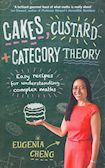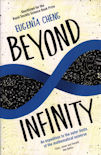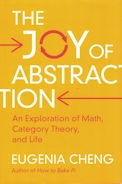Möbius bagels, Euclid’s flourless chocolate cake and apple π – this is maths, but not as you know it. In Cakes, Custard & Category Theory, mathematical crusader and star baker Eugenia Cheng has rustled up a batch of delicious culinary insights into everything from simple numeracy to category theory (‘the mathematics of mathematics’), via Fermat, Poincaré and Riemann.
Maths is much more than simultaneous equations and πr2: it is an incredibly powerful tool for thinking about the world around us. And once you learn how to think mathematically, you’ll never think about anything – cakes, custard, bagels or doughnuts; not to mention fruit crumble, kitchen clutter and Yorkshire puddings – the same way again.
The purpose of mathematics is to make difficult things easier; the purpose of category theory is to make difficult mathematics easier.
So argues research mathematician Eugenia Cheng in this excellent book. She starts off gently, with relatively simple mathematics, and oodles of real world examples, many based, unsurprisingly given the title, on cooking. These culinary examples serve both to illuminate the concepts, and to demonstrate her thesis: for example, finding out how much icing a cake needs is made easier using mathematics.
The first half of the book is about mathematics in general, and what it can and can't do. There are some lovely descriptions of the role of abstraction and generalisation, and the process of doing mathematics. By the end of this part we are confidently reading about axiomatisation. The second half then delves into the promised category theory. This covers the role of relationships and structure, along with a discussion of sameness. This is all achieved with a lightness of touch, whilst covering some quite profound ideas.
By the end, Cheng has explored a broad range of concepts, illuminating a lot about the philosophical stance of mathematicians, and the relationships of mathematics to the world. And now I want some cake.



